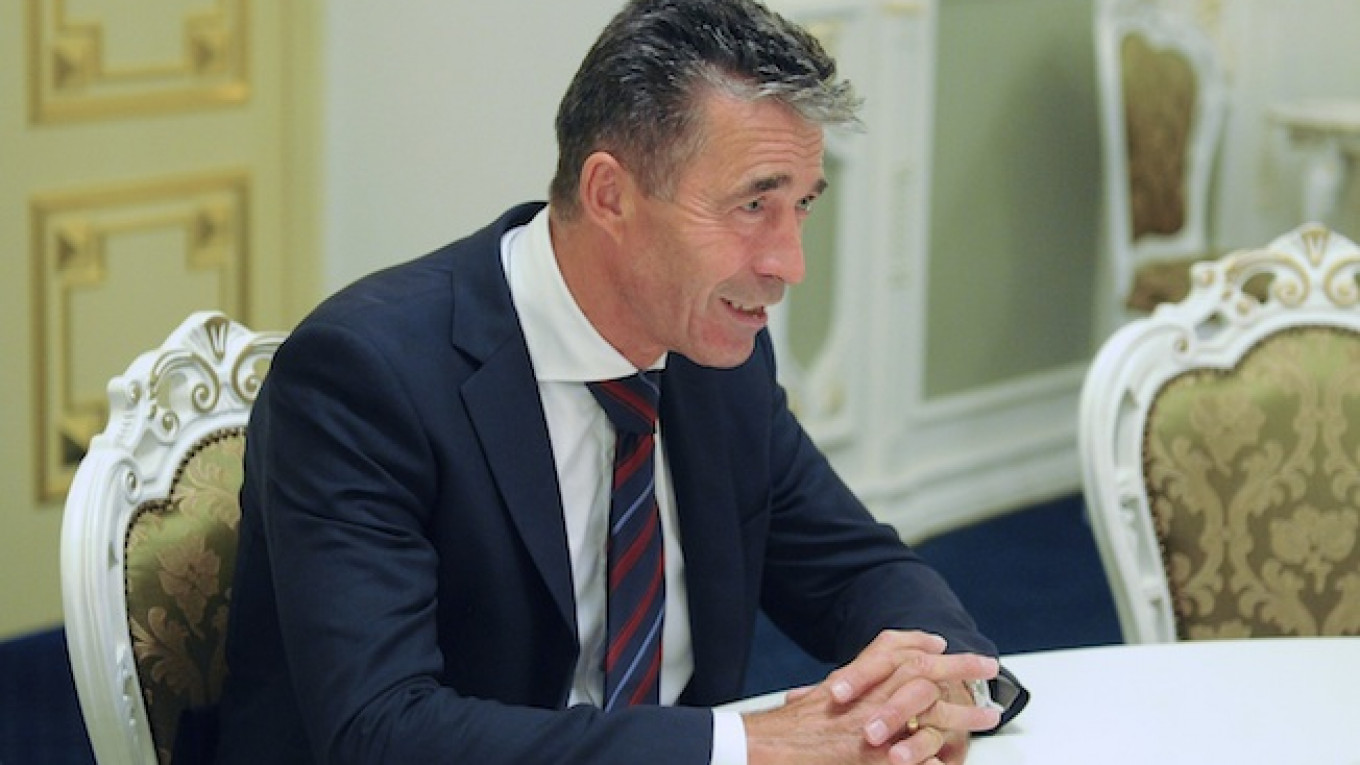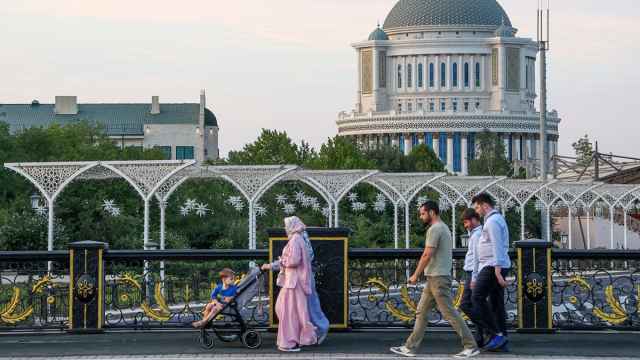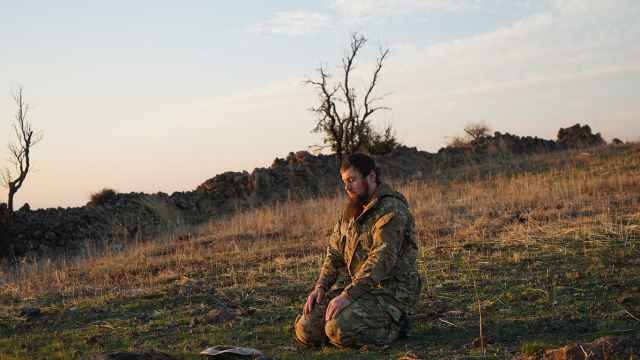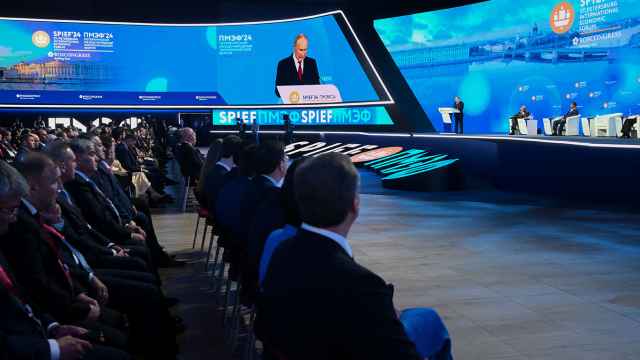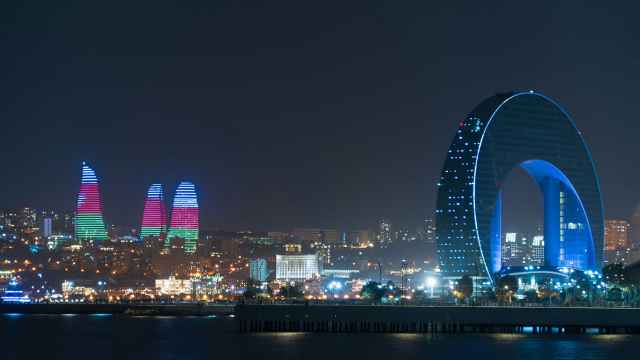KIEV — The head of NATO has called on Russia to "step back from the brink" of war by pulling its troops back from the Ukrainian border and warned further intervention in Ukraine would bring it greater isolation in the world.
Anders Fogh Rasmussen, the U.S.-led alliance's secretary general, made his call on Thursday during a visit to Ukraine in a show of solidarity after NATO warned of a possible invasion by Russia which, it said, had massed 20,000 troops near the frontier.
Saying Russia's support for the rebels was growing in "scale and sophistication", Rasmussen said: "I call on Russia to step back from the brink, step back from the border and not use peacekeeping as an excuse for war-making."
Earlier, he and Ukrainian Prime Minister Arseniy Yatseniuk discussed possible Western alliance support for Ukraine's defensive strength — excluding lethal aid — even as the Kiev government's forces continued losing men in clashes with pro-Russia separatists in the Russian-speaking east.
Shortly after Rasmussen spoke, rebels brought down a Ukrainian Mig-29 fighter plane and a military helicopter sent into the conflict zone to pick up casualties, the Ukrainian military said.
The Mig-29 came down near Horlivka, about 100 km (60 miles) from the border with Russia. Its crew managed to eject from the aircraft, military information spokesman Vladyslav Seleznyov told the Interfax news agency.
Defence spokesman Andriy Lysenko told journalists that government forces had clashed 19 times with separatists in the 24 hours up to Thursday morning, often coming under artillery and missile fire from within Russian territory.
"In the past 24 hours we have lost seven servicemen, and 19 received wounds," Lysenko said.
Regional authorities in Donetsk, the east's main industrial hub and now the main rebel redoubt, said one person had been killed at a medical facility when a shell struck on Thursday after a night of intensive artillery attacks.
Government forces, who say they are gradually tightening a noose around the rebels, denied responsibility. "We have accurate information that the Ukrainian military are not shelling those areas," said Lysenko.
Defense Support
Rasmussen said the downing of a Malaysian airliner with the deaths of all 298 people on board was a tragic consequence of Russia's "reckless" policy in Ukraine and he urged Moscow to end its support for the separatists and engage in "sincere dialogue" to bring peace.
Rasmussen, at his meeting with Yatseniuk, discussed the possibility of a proposed NATO trust fund to support Kiev's capabilities in such areas as command and control, communications and cyberdefence, the government said.
But the provision of lethal aid to Ukraine by the military alliance did not appear to have been discussed.
Asked about this at the news conference, he said it was not a question for the alliance as such but for its individual members.
The new deaths among government forces suggest Kiev's military losses now total more than 400 since the conflict with the pro-Russian separatists erupted in April.
The United Nations High Commissioner for Human Rights says the conflict has cost the lives of more than 1,100 people in all, including government forces, rebels and civilians.
Ukraine and its Western allies accuse Russia of orchestrating the revolt and arming the rebels, who have declared independent "people's republics" in the two main industrial regions. Moscow denies involvement.
The United States and European Union have imposed sanctions on Russia which Rasmussen said would broaden and deepen if it stepped up its intervention in Ukraine. Moscow has retaliated with a sweeping ban on imports of many Western foodstuffs.
Fighting has intensified since the shooting down of flight MH17, an act the West laid at the door of the rebels. Russia and the rebels blame the disaster on Kiev's military offensive.
See also:
NATO: Russia Could Use Peacekeeping Mission as Excuse to Invade Ukraine
A Message from The Moscow Times:
Dear readers,
We are facing unprecedented challenges. Russia's Prosecutor General's Office has designated The Moscow Times as an "undesirable" organization, criminalizing our work and putting our staff at risk of prosecution. This follows our earlier unjust labeling as a "foreign agent."
These actions are direct attempts to silence independent journalism in Russia. The authorities claim our work "discredits the decisions of the Russian leadership." We see things differently: we strive to provide accurate, unbiased reporting on Russia.
We, the journalists of The Moscow Times, refuse to be silenced. But to continue our work, we need your help.
Your support, no matter how small, makes a world of difference. If you can, please support us monthly starting from just $2. It's quick to set up, and every contribution makes a significant impact.
By supporting The Moscow Times, you're defending open, independent journalism in the face of repression. Thank you for standing with us.
Remind me later.


